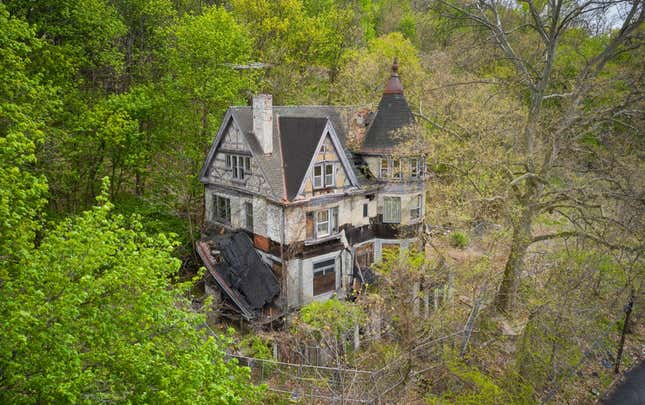
A disheveled old house in one of Pittsburgh’s Blackest neighborhoods just received more than $800,000 towards its renovation, including money from former president George W. Bush and his wife, Laura.
The ramshackle old Victorian that sits on Apple Street in the city’s Homewood neighborhood–which this week was the focus of a walking tour and community meeting t to combat violence from the city’s first Black mayor, Ed Gainey–has been an eyesore for years. It’s windows are either boarded or missing. Much of the facade has fallen away to reveal wood rot on the frame underneath. Weeds are overgrown and some sections of roof have even collapsed.
Why all the interest and cash for this one old house? It once was headquarters of the National Negro Opera Company, considered “the first permanent African-American opera company in the nation,” according to the website of the nonprofit organization raising money to renovate the building. It’s unclear how long the opera company operated, but the house itself is symbolic of the rise and decline of Black culture in the Homewood neighborhood and in Pittsburgh over the past century.
From the Pittsburgh Post Gazette
The house, built in 1894 in the Queen Anne style, was the birthplace of the opera company founded in 1941 by singer Mary Cardwell Dawson. Known as Mystery Manor, the house also became a destination for Black entertainers and athletes, including Cab Calloway, Lena Horne, Duke Ellington and Roberto Clemente.
Eleven years before Dawson founded the opera company, the house was bought by William “Woogie” Harris, who the opera house’s website calls one of Pittsburgh’s first Black millionaires. Harris’ brother, Charles “Teenie” Harris, was a famed photographer at the time whose archive chronicles an era when Pittsburgh’s Black communities were centers of culture and entrepreneurship.
Since then, Pittsburgh neighborhoods like Homewood and the Hill District, the birthplace of August Wilson, have seen tremendous decline and disinvestment. The city is now better known for having been ranked in 2019 as among the worst for quality of life for Black folks and for entrenched racial disparities in wages, infant mortality rates, homicides, homeownership and more. Last year, the city elected Gainey as the first Black mayor in the city’s more than 200-year history.
Meanwhile, landmarks in Pittsburgh’s historically Black communities have fallen into disrepair, too. In 2018, Denzel Washington pledged $5 million toward the restoration of Wilson’s childhood home, joining seven figure donations from Oprah Winfrey and Tyler Perry. That project remains unfinished.
Likewise, more than $2 million has been raised over the past two years toward the restoration of the National Opera House but to date, no construction has begun.

